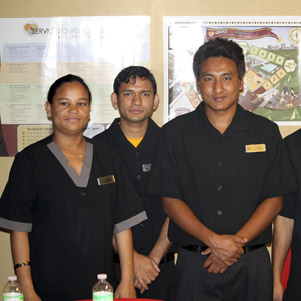Costal Enterprises, Inc.
$5.5 Million Awardee

For more than three decades, Coastal Enterprises, Inc., (CEI) has pioneered new ways to create economic opportunity in rural communities.
Founded in 1977, CEI was Maine’s first local development company. In its early years, the organization focused on mobilizing capital to create jobs in the state’s natural resources industries, such as fishing, farming, and forestry. Over time, however, it has expanded to serve the rest of New England and beyond, and has diversified its lending to include manufacturing enterprises, affordable housing projects, and community facilities.
And now, with the creation of its highly innovative Working Partners Initiative (WPI), CEI has developed another new way to serve rural communities—this time using the New Markets Tax Credit (NMTC) program.
CEI’s experience with the NMTC program extends back more than a decade. The organization was one of the program’s principal architects and has remained deeply involved in policy development and advocacy since the program was enacted by Congress in 2000. And CEI has used the NMTC program extensively. Over the years, it has been awarded a total of $683 million in tax credits, which makes it the program’s second largest allocatee and the largest serving rural communities.
CEI conceived the Working Partners Initiative as a way to use the fees it earns from its NMTC projects to build the capacity of other community-based economic development organizations. The idea is simple. When CEI undertakes an NMTC project that is large enough to generate significant fee income, it uses a portion of that fee income to support the compliance and reporting activities associated with the project and to capitalize new projects of its own. The remainder it passes on to other CDFIs—its working partners.
Through the Initiative, CEI has established formal partnerships with seven CDFIs around the nation that serve low-income rural communities, and it shares a portion of its fee income from its NMTC projects with these partners to enable them to undertake new projects in their own communities. The Initiative thus brings new resources to CDFIs and rural communities that would not otherwise have access to them.
The WPI has already helped to launch projects in rural markets in 12 states from Hawaii to Louisiana. CEI will use the $5.5 million Wachovia Wells Fargo NEXT Award to expand the program. The organization expects to add three to five new partners and estimates that the NEXT Award will almost double the amount of money that the initiative provides to community-based rural development organizations. CEI also believes that the Initiative offers a model that other CDFIs can easily adopt, and hopes that the NEXT Award will elevate the program to national view.
The whole idea, according to Ron Phillips, CEI’s President and CEO, is to widen the circle of benefits. “The Working Partners Initiative is the largest and perhaps the first program to use fee-sharing from NMTC projects to build the capacity of rural CDFIs,” he says. “It enables us to get the money back out to other CDFIs so it can have more impact at the local level.”

